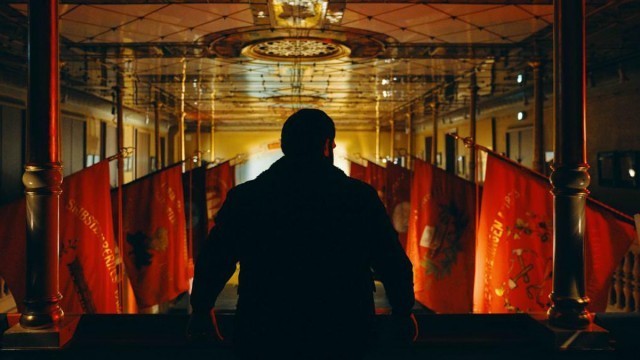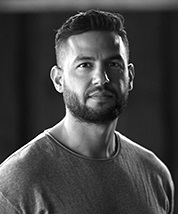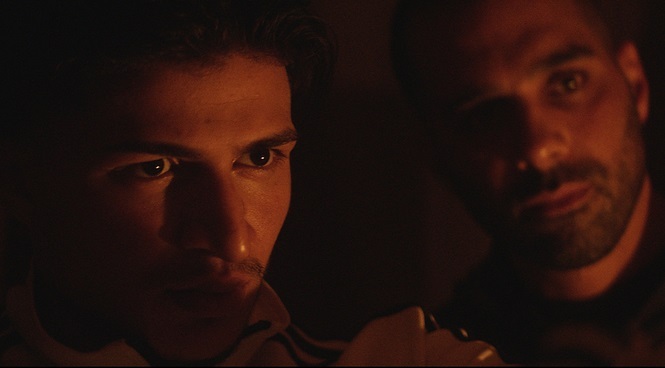[Herald Interview] ‘Sons of Denmark,’ a glimpse into a dystopian future
By Yoon Min-sikPublished : May 13, 2019 - 16:19
Danish director discusses his debut feature, a political thriller about a future marred by extremism
JEONJU, North Jeolla Province -- There is a thin line between standing up for what you believe is right and extremism, a line that fades when the safety and security of the ones you hold dear are on the line.
This is realm the young director Ulaa Salim ventures into in the film “Sons of Denmark,” set in 2020s Denmark, where a terrorist attack by an extremist group sends the country spiraling down into xenophobia and political extremism.
Salim sat down to discuss the film with The Korea Herald after his first feature film was screened at the Jeonju International Film Festival.
“I find it very absurd that we keep talking about differences, we keep talking about religious and cultural researches. But what I found out during the research of this film is that it’s not these things that are dividing us, keeping us apart. It’s more the human instincts, it’s the things that we have in common which are actually creating the conflict,” he said.
Salim said he wanted to turn the talk about racial conflict around. “I wanted to say, ‘Listen, what if all the characters here were fighting for the same thing?’”
JEONJU, North Jeolla Province -- There is a thin line between standing up for what you believe is right and extremism, a line that fades when the safety and security of the ones you hold dear are on the line.
This is realm the young director Ulaa Salim ventures into in the film “Sons of Denmark,” set in 2020s Denmark, where a terrorist attack by an extremist group sends the country spiraling down into xenophobia and political extremism.
Salim sat down to discuss the film with The Korea Herald after his first feature film was screened at the Jeonju International Film Festival.
“I find it very absurd that we keep talking about differences, we keep talking about religious and cultural researches. But what I found out during the research of this film is that it’s not these things that are dividing us, keeping us apart. It’s more the human instincts, it’s the things that we have in common which are actually creating the conflict,” he said.
Salim said he wanted to turn the talk about racial conflict around. “I wanted to say, ‘Listen, what if all the characters here were fighting for the same thing?’”

Extremism mirrored
The film does not take sides. Rather, it shows extremist groups on both sides whose rhetoric is eerily similar. Stuck between the two worlds are the film’s protagonists: 19-year-old Zakarias and his mentor Ali, whose brotherhood is tested in the face of the hate-fueled chaos that engulfs the society.
“The film does not take any political stand. And also when Zakarias sees Martin Nordahl, he sees him as the bad guy, and the audience -- through him -- sees him as the bad guy,” Salim said. “Then the story opens up and you see him as a human being that has the same emotions as Zakarias has.”
For those familiar with Danish cinema, Rasmus Bjerg is a name that will likely bring a smile to your face. But even for those with no such knowledge, the man playing the main antagonist has the look of a wholesome, good-natured guy.
“I never wanted to go on and say, ‘Oh, he is evil.’ On the contrary, he is a human being,” Salim said.
The same extremist rhetoric, he said, can sound different when it’s uttered by someone who looks like a member of a majority group, like Nordahl.
“He’s saying some horrible things, but we (the Danish society in the film) let him (speak) on daytime TV,” he said.

The sense that this is an issue on both sides is made clear when a man who loses his girlfriend in the terror attack in the film’s opening scene reappears later on in the film.
“When you see the beginning of the film, and when you see him an hour later, without even having to think about it, you understand why he’s there. But if you understand that, you understand the motivations of all the other characters,” Salim said.
Salim, who also wrote the film, cleverly devises its structure so that it completes a full cycle, while weaving together the two stories told by two main characters.
The director pointed to the way society’s rhetoric has been changing in the real world, saying it could potentially build up and yield catastrophic results.
“If you keep saying horrible things for 20 years, then people will grow up in a horrible environment. And that would lead to bigger issues in society,” he said. While today’s Denmark is far from such extremism, Salim said this is an issue people must address now.
“I think what cinema should do is that it should handle the tough issues so that we can keep the society good. Of course, the issue is there. But I hope it will never come to this.”
Sons of Denmark, children of society
Of course, real-life Denmark is a far cry from the pain-stricken chaos depicted in the film. While the 2015 Copenhagen shootings sent shock waves around the world, they did not incite xenophobic attacks there or give rise to a neo-Nazi ruling party.
At the same time, the way the film illustrates how fear directs us toward radicalism is provocative.
“I think the limits for what is extreme moves very slowly. It moves in a slow pace and in so many levels that we don’t notice it. And all of a sudden, we’re here,” Salim said. “From there, where do we go? By definition if something extreme becomes normal, then something else must be extreme.”

Two centuries ago, the notion that a civilized, law-abiding, God-fearing man could legally claim another human being as property was widely accepted across the world. Until a few decades ago, women were not permitted to vote in several parts of the US.
As Salim pointed out, there have always been times when what seems unthinkable today was the norm.
“I think it would be very arrogant to say that this time and age, there would be nothing that we would look back in 50 years and say, ‘How was that acceptable?’ because we are also children of the society.
“For me, one of the key issues is the way we speak about each other. ... The rhetoric is the hate, the fear, and the problems that it causes (is the key issue). For me, that is the absurdity going on. I tried to encapsulate the last 20 years of rhetoric of hatred in the film.”
While the “Sons of Denmark,” the extremists in the film, may look like monsters, Salim said they’re merely products of their times and of the rhetoric of hate that has poisoned the fictional society.
“These are the sons of Denmark, the children of the society. And who are sons of Denmark? It’s everybody.”
Despite some of the gloomier signs, the director said the film’s reception shows people’s willingness to think more about this issue.
The film has been invited to compete in international film festivals and got a wide release in Salim’s home country despite being a low-budget film.
“I feel that people want to see this film, and that they can go open-minded into the film,” he said. “I think prejudice will always exist. It has always existed. But by doing new things, you can counter the prejudices.”
Onward and upward
While “Sons of Denmark” is set in Denmark, it deals with universal issues -- fear, hate, longing for security. As a budding director, Salim said he wanted the film to be about a broad subject so that the emotions in it would resonate with people elsewhere in the world.
“I wanted my films to be very locally anchored, in the society that I live in. but as for emotions, I wanted to be very universal. Because I think films can transcend language, transcend time, generations, because what we speak about is very broad, in human emotions,” he said.
His next film will be about “love and sorrow,” he said, about the sense that one can never truly be happy in a society saturated with technology.
As he did with his first film, Salim said he wishes to push the boundaries of filmmaking.
“What if we could truly press a button and be happy? Would we be happy? I wanted to put a premise in, which is a real-world premise. I want to have a clear premise of the society, which is not just now and here.”
By Yoon Min-sik
(minsikyoon@heraldcorp.com)

















![[KH Explains] Hyundai's full hybrid edge to pay off amid slow transition to pure EVs](http://res.heraldm.com/phpwas/restmb_idxmake.php?idx=652&simg=/content/image/2024/04/18/20240418050645_0.jpg&u=20240419100350)

